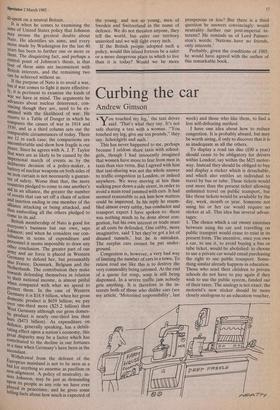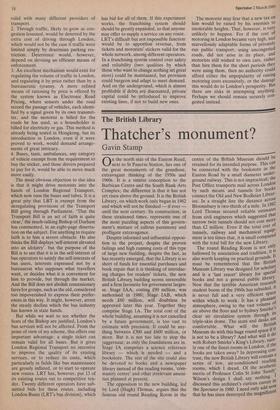Curbing the car
Andrew Gimson
Njou touched my leg,' the taxi driver JL said. 'That's what they say. It's not safe sharing a taxi with a woman. "You touched my leg, give me ten pounds," they say. Schoolgirls and such.' This has never happened to me, perhaps because I seldom share taxis with school- girls, though I had innocently imagined that women have more to fear from men in taxis than vice versa. But I agreed with him that taxi-sharing was not the whole answer to traffic congestion in London, or indeed anywhere. We were moving at less than walking pace down a side street, in order to avoid a main road jammed with cars. It had seemed reasonable to ask him how matters could be improved. In his reply he resem- bled almost every cabby, bus conductor and transport expert I have spoken to: there was nothing much to be done about con- gestion, but his own interest or trade must at all costs be defended. One cabby, more imaginative, said 'I bet they've got a lot of disused tunnels,' but he is mistaken. The surplus cars cannot be put under- ground. Congestion is, however, a very bad way of limiting the number of cars in a town. To ration road use like this is to destroy the very commodity being rationed. At the end of a queue for soup, soup is still being dispensed. In a severe traffic jam nobody gets anything. It is therefore in the in- terests both of those who dislike cars (see my article, 'Motorised responsibility', last week) and those who like them, to find a less self-defeating method.
I have one idea about how to reduce congestion. It is probably absurd, but may be worth airing, if only to discover that it is as inadequate as all the others.
To display a road tax disc (£90 a year) should cease to be obligatory for drivers within London', say within the M25 motor- way. Instead they should be obliged to buy and display a sticker which is detachable, and which also entitles an individual to travel by bus or tube. These tickets would cost more than the present ticket allowing unlimited travel on public transport, but like those tickets would be available by the day, week, month or year. Someone not using his or her car would require no sticker at all. This idea has several advan- tages: 1. The choice which a car owner exercises between using his car and travelling on public transport would cease to exist in its present form. The incentive, once you own a car, to use it, to avoid buying a bus or tube ticket, would be abolished: to choose to use a private car would entail purchasing the right to use public transport. Some- thing similar already happens in education. Those who send their children to private schools do not have to pay again if they wish to use the public system, funded out of their taxes. The analogy is not exact: the motorist's new sticker should be more closely analogous to an education voucher, valid with many different providers of transport.
2. Through traffic, likely to grow as con- gestion lessened, would be deterred by the extra cost of driving through London, which would not be the case if traffic were limited simply by draconian parking res- triction. Deterrence would, however, depend on devising an efficient means of enforcement.
3. An excellent mechanism would exist for regulating the volume of traffic in London, and regulating it by price rather than by a bureaucratic tyranny. A more refined means of rationing by price is offered by the system known as Electronic Road Pricing, where sensors under the road record the passage of vehicles, each identi- fied by a signal given by its own transmit- ter, and the motorist is billed for the roads he has used, as a householder is billed for electricity or gas. This method is already being tested in Hongkong, but its introduction in London, even if it were proved to work, would demand arrange- ments of great intricacy.
4. Buses, taxis, ambulances, any category of vehicle exempt from the requirement to buy the sticker, and those drivers prepared to pay for it, would be able to move much more easily.
The most obvious objection to this idea is that it might drive motorists into the hands of London Regional Transport, which now runs the buses and tubes. It is a great pity that LRT is exempt from the deregulating provisions of the Transport Bill going through Parliament. 'That the Transport Bill is an act of faith is quite clear,' the much-talking Bishop of Durham has commented, in an eight-page disserta- tion on the subject. For anything to require faith is to him a severe obstacle. He also thinks the Bill displays 'self-interest elevated into an idolatry'. but the purpose of the Bill is to see that it is in the self-interest of bus operators to satisfy the self-interests of bus users, interests expressed not by a bureaucrat who supposes what travellers want, or decides what it is convenient for him to provide, but through the market. And the Bill does not abolish concessionary fares for groups, such as the old, considered too impoverished to express their prefer- ences in this way. It might, however, arrest the steady decline which the bus industry has known in state hands.
But while we wait to see whether the fears of the Bishop are justified, London's bus services will not be affected. From the point of view of my scheme, this offers one important advantage: a single ticket can remain valid for all buses. But it gives London Regional Transport no incentive to improve the quality of its existing services, or to reduce its costs, which particularly in fields like bus maintenance are grossly inflated, or to start to operate new routes. LRT has, however, put 13 of its existing routes out to competitive ten- der. Twenty different operators have sub- mitted bids for these routes, including London Buses (LRT's bus division), which has bid for all of them. If this experiment works, the franchising system should should be greatly expanded, so that anyone may offer to supply a service on any route. LRT's difficult but not impossible function would be to apportion revenue, from tickets and motorists' stickers valid for the whole network, among different operators. In a franchising system control over safety and reliability (two qualities by which those who want to change nothing set great store) could be maintained, but provision could burgeon and adapt to meet demand. And on the underground, which is almost profitable if debts are discounted, private capital could be introduced to improve existing lines, if not to build new ones. The motorist may fear that a new tax on him would be raised by his enemies to intolerable heights. That, however, is very unlikely to happen. For if the cost of motoring in London became very high, and marvellously adaptable forms of privately run public transport, using uncongested roads, did not arise in its place, and motorists still wished to own cars, rather than hire them for the short periods they were using them, then no authority could afford either the unpopularity of raising motoring costs excessively, or the damage this would do to London's prosperity. But there are risks in attempting anything. Perhaps we should remain securely con- gested instead.















































 Previous page
Previous page